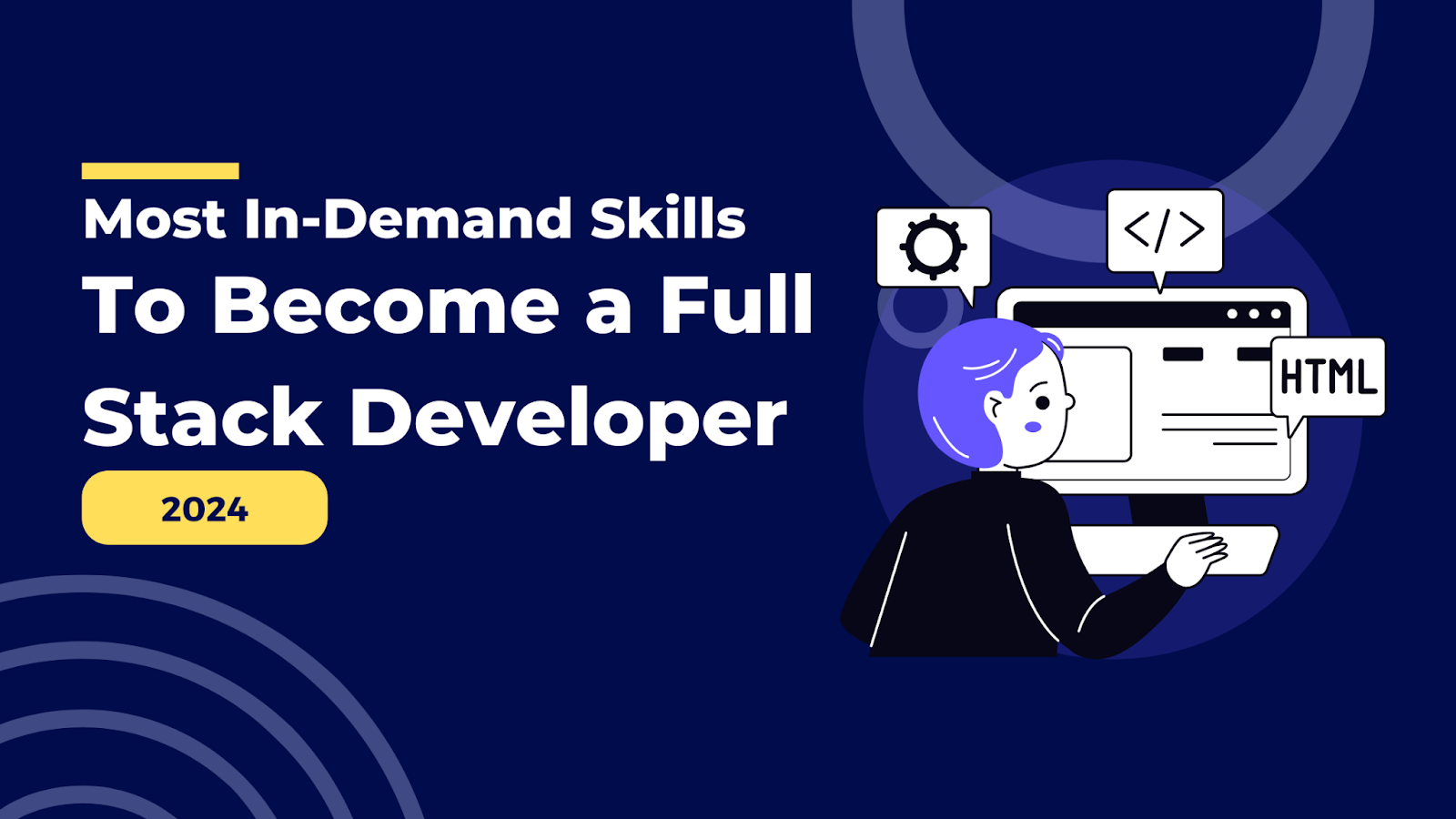Most In-Demand Skills to Become a Full Stack Developer in 2024
As technology continues to change, the role of a full stack developer is becoming increasingly crucial. Full stack developers can work on both the front-end and the back-end of development, making them highly valuable for companies aiming to create robust and scalable web applications. In 2024, the demand for skilled full stack developers continues to grow. These professionals need to keep up with new trends and technologies. This article discusses the most important skills for full stack developers who want to be successful in 2024.
The Evolution of Full Stack Development
In full stack development, professionals must be skilled in both front-end and back-end technologies. This allows software developers to oversee the entire software development process, from conception to implementation. Full stack developers used to need knowledge of languages like HTML, CSS, JavaScript, and server-side languages like PHP or Ruby on Rails. However, as technology advances rapidly, the skills needed for success have evolved significantly. Enrolling in a full stack developer course can help you stay updated with these evolving technologies.
The Most Demanded Skills in 2024 for Full Stack Developers
- HTML & CSS: These are essential tools for structuring and designing web pages. They ensure sites look and function well across various devices and browsers.
- JavaScript: This is crucial for modern web development. It enables developers to build interactive, fast, and dynamic web apps, enhancing user interactions and improving website functionality.
- Frameworks: Knowledge of front-end frameworks like React, Angular, or Vue.js, and back-end frameworks like Express.js or Django, accelerates coding, promotes reuse, and helps adopt best practices and industry standards.
- Basic Operating Systems Knowledge: Understanding operating systems like Linux or Windows is important for deploying, configuring, and maintaining web apps across different hosting environments, ensuring they perform well, are secure, and can scale.
- Git and GitHub: Proficiency in Git version control and platforms like GitHub is essential for teamwork, code clarity, accountability, managing project stages, fixing conflicts, and revising code as needed.
- Backend Languages: Knowledge of backend languages like Node.js, Python, Ruby, or Java is crucial for handling complex server-side logic, interacting with databases, and using third-party services, enabling the creation of scalable, robust, and feature-rich web apps.
- VCS Skills: Familiarity with Version Control Systems like Git is key. It allows developers to manage code changes, collaborate with teams, maintain project integrity, and facilitate code reviews, ensuring stability, quality, and maintainability.
- Database Knowledge: Understanding databases, including SQL (relational) and NoSQL (non-relational), is vital for designing strong, scalable, and secure web apps. It helps in organizing data, improving query speed, safeguarding data, and enabling apps to grow with increasing data sizes.
- Web Architecture Knowledge: Grasping web architecture principles such as scalability, performance optimization, security best practices, and microservices architecture is essential. This knowledge helps developers design robust, fast, and scalable web apps that can handle more users, adapt to business needs, and withstand failures and risks.
- Understanding APIs: Knowledge of APIs and how they facilitate communication between different systems simplifies developers' jobs. It allows for building modular, interoperable, and extensible web applications, utilizing external services and data to enhance user experiences through third-party APIs and services.
- HTTP and REST: Understanding HTTP protocols and RESTful API designs aids in smooth client-server communication. It improves interaction efficiency, scalability, and integration across various systems and services.
- Architecture/Design Patterns: Familiarity with design patterns like MVC or MVVM helps in structuring and designing web apps. It supports modularity, maintainability, and code reuse, enhancing the extensibility and scalability of different sections and components of the app.
- Monitoring Tools: Using tools such as New Relic, Datadog, or Prometheus helps monitor app performance and system health. This aids in identifying and resolving issues, improving the app's performance, reliability, and scalability, and ensuring seamless and responsive user experiences.
- NPM Skills: Proficiency in Node Package Manager (NPM) helps manage project dependencies, speeds up development, and allows developers to leverage numerous libraries, frameworks, and tools to build feature-rich, scalable, and maintainable Node.js apps.
- Soft Skills: Effective communication, problem-solving, teamwork, and time management are essential for a productive team. Understanding client requirements, addressing complex project issues, and ensuring the project meets business needs with quality are crucial for success.
Best Skills to Upgrade
For full-stack developers aiming to enhance their skill set in 2024, focusing on these key areas is important. Staying updated with the latest tech trends and continuously learning is vital in the fast-paced field of software development. Improving soft skills such as problem-solving, communication, and teamwork will further enhance effectiveness in the workplace.
Conclusion
In conclusion, full stack developers remain highly valuable in 2024, as companies seek professionals who can manage the complexities of modern web development. Aspiring full stack developers should acquire the in-demand skills mentioned in this article to stand out in a competitive job market. By continuous learning and adapting to new technologies will ensure their relevance in the ever-evolving software development landscape.
